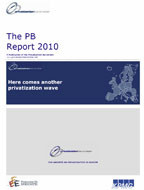PB Annual Report 2010
What a year! 2010 was unlike any other in financial history, and particularly in the history of privatization, in that it saw the largest share offering ever–indeed the largest security offering of any type—as well as the largest initial public offerings in world and in U.S.
history. This year also set records both for the most active quarter ever for initial public offerings (and the second highest annual total) and for the largest annual value of privatization sales ($213.6 billion; €159.9 billion) since the phenomenon of state divestments began over four decades ago. 2010 also witnessed the full emergence of the BRIC (Brazil, Russia, India, and China) countries as major financial players and the continuing shift of financial power eastwards, towards Asia.
To top off this amazing year, the United States reprised its surprising role as the world’s largest privatizer for the second year running, while China, Brazil, France, Turkey, Poland, and India accounted for ranks two through seven.
As has been true for the past several years, the 27 nations of the European Union accounted for a small minority of the aggregate global number and value of privatization deals during 2010. There were 99 EU privatizations that raised €33.1 billion ($44.2 billion), but this represents only 20.6% of the worldwide total, far below the long-run average EU share of 47.1%.
The relative importance of privatized firms in global markets continued to manifest itself during 2010. In fact, the 150 fully and partially privatized companies in the Financial Times FT 500 list of the world’s 500 most valuable companies had a combined market capitalization of $7.23 trillion (€5.41 trillion) in June 2010. All in all, the future of privatization seems assured. Several EU governments – including Spain, Poland, Britain, Ireland, Portugal, and, especially Greece – have publicly announced plans to launch or continue major privatization programs during 2011 and beyond.

